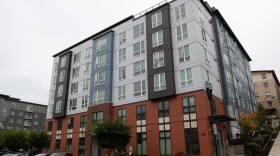Tacoma residents now have access to a new food waste disposal pilot program. A partnership between the City of Tacoma and a startup called Mill launched Tuesday allowing residents to buy a new type of kitchen bin that turns food scraps into chicken feed.
It’s a spin on more traditional methods of using food waste, like composting, that people may be more familiar with either by using brown food/yard waste trash bins provided by the city or by using private compost bins on their property.
Lerrin Bergstein has been making and using his own compost to create soil for his garden for about three years.
“The main reason I got into is because I’m cheap and I hate going to buy soil and spending hundreds of dollars a year to start my garden,” said Bergstein.

He said it’s easy too.
“You just collect stuff and dump it out there,” Bergstein said of his two 6-foot wide compost bins in his backyard. “I don’t understand why everyone doesn’t do it.”
Some people don’t have the space for compost bins, don’t have gardens to use their homemade soil in, or they just don’t want to deal with the mess of collecting food scraps. Those are Mill’s ideal customers, said Alyssa Pollack, head of business at Mill.
“Instead of having the countertop bin with the icky drippy bags and fruit flies, you just toss all of your food scraps into the Mill kitchen bin and it dries and deodorizes the material” Pollack said.
The bins look like regular trash cans but they use technology to turn the food scraps into what the company calls "Food Grounds." When the bin is full, Pollack said it takes her family a few weeks to fill, the customer lets the company know through an app and places the material into a prepaid box. Then the customer sends the food scraps back to Mill in the mail, and from there the company plans to turn the scraps into chicken feed.

Mill claims the process is different from composting because it dries and crumbles the food scraps rather than breaking it down and turning it into another material like soil. It’s a different way to divert food waste away from landfills.
Tacoma is the first city to partner with the company. The city will get about 600 bins and the company will share data from the participants that can help the city make progress toward its sustainability goals.

A city official said in a press release that Tacoma started collecting food waste in 2012 and has since diverted up to 1,000 tons per year of food waste from landfills.
Still, a 2015 study showed 28% of Tacoma's residential garbage is made up of food waste that could be diverted. This pilot program could help in that effort. Making food waste disposal easier would also be better for the environment, said Pollack.
“We estimate that households that participate in the Mill membership will avoid about half a ton of CO2 equivalent emissions each year,” Pollack said. The average American alone produces as much as 16 tons of CO2 emission each year according to some estimates.
Mill membership is subscription based and costs $33 per month to participate. That includes the bin, shipping costs, and an app. Residents can sign up for a membership at Mill.com/Tacoma.






